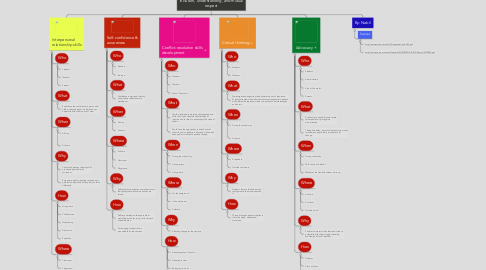
1. Interpersonal relationship skills
1.1. Who
1.1.1. Students
1.1.2. Teachers
1.1.3. Parents
1.2. What
1.2.1. Pupils have the confidence to get on with others; they see good in others and can empathize with other points of view.
1.3. When
1.3.1. All day
1.3.2. At home
1.4. Why
1.4.1. Critical and creative thinking skills are developed within the curriculum.
1.4.2. Empower pupils to develop research and problem-solving skills as they learn to think differently.
1.5. How
1.5.1. Group work
1.5.2. Collaboration
1.5.3. Questioning
1.5.4. Discussion
1.5.5. Repetition
1.6. Where
1.6.1. Classroom
1.6.2. Playground
2. Conflict-resolution skills development
2.1. Who
2.1.1. Students
2.1.2. Teachers
2.1.3. School Councelor
2.2. What
2.2.1. Pupils are helped to develop the language and skills to voice and explain their feelings of injustice and to listen to and respect the views of others.
2.2.2. Pupils have the opportunity to attend school councils, and to debate in class and clubs which have power to influence positive change.
2.3. When
2.3.1. During the school day
2.3.2. During recess
2.3.3. During lunch
2.4. Where
2.4.1. On the playground
2.4.2. In the classroom
2.4.3. Cafeteria
2.5. Why
2.5.1. Affecting change for the positive
2.6. How
2.6.1. Attending school councils
2.6.2. Debating in class
2.6.3. Belonging to clubs
2.6.4. Role playing
3. Advocacy
3.1. Who
3.1.1. Students
3.1.2. Administrators
3.1.3. School Councelor
3.1.4. Parents
3.2. What
3.2.1. Pupils acquire the skills to advocate for respect and fight against discrimination.
3.2.2. Through debates, class activities and community involvement, pupils learn to advocate for change.
3.3. When
3.3.1. During school day
3.3.2. With family and friends
3.3.3. Whenever the students witness a wrong.
3.4. Where
3.4.1. At home
3.4.2. At school
3.4.3. Outside world
3.5. Why
3.5.1. Pupils who interact with others and learn to empathize with their struggles develop knowledge of social injustices.
3.6. How
3.6.1. Debates
3.6.2. Class activties
3.6.3. Community involvment
4. Self-confidence & awareness
4.1. Who
4.1.1. Students
4.1.2. Teachers
4.2. What
4.2.1. Confidence in personal identity and positive self-esteem are developed.
4.3. When
4.3.1. All day
4.3.2. At home
4.4. Where
4.4.1. At home
4.4.2. Classroom
4.4.3. Playground
4.5. Why
4.5.1. Self-confidence increases as students learn their background has value and can be valued.
4.6. How
4.6.1. Skills are developed through teacher modelling, active learning, circle time and interactive play.
4.6.2. Encouraging students to be accountable for their actions.
5. Critical thinking
5.1. Who
5.1.1. Students
5.1.2. Teachers
5.2. What
5.2.1. Stereotypes and negative attitudes develop out of ignorance. Pupils confronted with multi-culturalism and exposure to people with different backgrounds learn to question social stereotypes and norms.
5.3. When
5.3.1. During the school day
5.3.2. At home
5.4. Where
5.4.1. Everywhere
5.4.2. Outside community
5.5. Why
5.5.1. Students learn to think about the reality around them and question it.
5.6. How
5.6.1. Through thought-based activities in class, readings, debate and discussion,
6. By: Nabil
6.1. Sources
6.1.1. http://www.edu.gov.mb.ca/k12/specedu/fas/pdf/5.pdf
6.1.2. http://www.unesco.org/new/fileadmin/MULTIMEDIA/FIELD/Tehran/227983E.pdf
